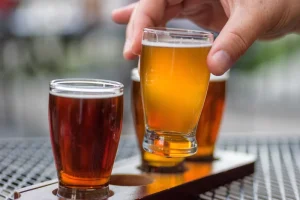
These issues can then lead to more anger and further difficulty controlling emotions and outbursts. For example, some cases of domestic violence have turned fatal because one person refused to leave when their partner was being abusive to them. In some cases, you can’t change an angry drunk, and you need to make the decision that’s right for you and other members of the household, especially children. A “crazy drunk person” is one who drinks excessively and frequently due to alcoholism.
Cognitive Function

Anger and aggression may also be linked to how heavy alcohol consumption impacts nutrition, neuroinflammation, and the microbiome. When under the influence of alcohol, many people struggle to comprehend and properly identify the emotions of those who are around them as well. As we mentioned in the introduction, studies have shown that alcohol has been the contributing factor to more violent acts than any other substance of abuse, but why exactly is that?
The Problem With Calling Someone an “Alcoholic”
By contrast, some individuals’ alcohol consumption contributes to their anger, hostility, and even aggression. In his case, he was already predisposed to anger arousal before he had his first drink. Finally, despite positive ratings of treatment satisfaction, attendance was less than ideal for both interventions. Analyses utilized the intent-to-treat sample, i.e., all participants alcoholism and anger without regard to attendance and treatment completion. Potential modest treatment responses among clients with little or no exposure to treatment may have obscured positive effects for those receiving all or nearly all of the intervention. The co-treatment of alcohol recovery and anger management can be a very individualized process that may change according to your needs.
Take the First Step Towards a Healthier Life
- By contrast, some individuals’ alcohol consumption contributes to their anger, hostility, and even aggression.
- To combat aggressive behavior when drinking, individuals should consciously seek help.
- As a result, you may be overly aggressive during a situation where you’d otherwise notice the cues that tell you to think more rationally.
- Feelings of anger can be so powerful that they cloud their judgment and second-guess their reasons for being sober.
Even after you have finished the detox process, you may still experience anger. Chronic alcohol consumption can reduce the functioning of the prefrontal cortex. Because this part of the brain is responsible for impulse control, you may struggle to control a sudden urge to behave aggressively. In comparison, aggression is a collection of behaviors that cause harm to yourself or other people. Some people have a higher likelihood of experiencing chronic anger over time, which is known as trait anger.
- Through empathy and support, we can create environments that nurture healthier relationships with both alcohol and emotions.
- Stress also affects focus and attention abilities, and heightens energy while decreasing appetite and sleep functions.
- Specifically, clients marked by higher anger did better at one- and three-year follow-up in the motivational enhancement condition than in cognitive-behavioral therapy (CBT) or the AAF condition (Karno & Longabaugh, 2004).
- Addressing and letting go of anger is vital in the Alcoholics Anonymous (AA) 12-step approach, which involves a moral self-inventory and overcoming personal flaws.
- Once this happens, many end up thinking that their recovery is worthless, and they might decide to no more extended care about their recovery.
It also teaches the person more healthy ways to deal with their anger moving forward such as exercise, journaling, and other ways that we discussed earlier. Even though they speak about anger management in most Alcoholics Anonymous 12-step programs and in rehab, experiencing these emotions is different once you’re sober. Sometimes, little things like being unable to deal with or express a specific feeling can lead to an angry outburst. As a result, there’s a lot of trial and error throughout your recovery, including finding the best anger-management techniques for you. Severe alcohol use disorder (alcoholism) is an alcohol use disorder (AUD) characterized by an inability to control or stop drinking alcohol despite adverse effects on your personal or professional life, finances, and physical and mental health.
The World Health Organization (WHO) warns that alcohol interferes with a person’s cognitive and physical functioning, inhibiting self-control and making it more difficult for a person to recognize when things have gone too far. It can be harder for someone under the influence of alcohol to notice typical warning signs that emotions, especially anger, may be getting out of control. Alcohol Myopia Theory also makes the counterintuitive prediction that alcohol intoxication can actually decrease aggression, even below that of sober individuals.
Clarifying the distinctions between these emotional responses
Before discussing the connection between anger and alcohol, it’s important to understand their relationship as a whole. While many people use alcohol as a way to unwind and relax after a tough day, or as a way to get together with friends and enjoy a night out, not everyone is a “happy drunk”. Many people find that when they drink or drink too much, they get upset, angry, or even violent. While it might get laughed off as a funny story the connection between anger and alcoholism is real and it can be quite scary.

You may be wondering what you can do when someone shows signs of rage after consuming too much alcohol. While it is always better to discourage the use of alcohol for people who have this tendency, some things can be done to manage the situation. Reframe supports you in reducing alcohol consumption and enhancing https://ecosoberhouse.com/ your well-being. You’ll meet millions of fellow Reframers in our 24/7 Forum chat and daily Zoom check-in meetings. Receive encouragement from people worldwide who know exactly what you’re going through! You’ll also have the opportunity to connect with our licensed Reframe coaches for more personalized guidance.
Unfortunately, there will be problems at some point during your recovery. Whether your car breaks down or you lose your job, you need to be prepared for unexpected triggers. A strong support system will give you plenty of people to call when you encounter an obstacle.

Psychological “Baggage” and Social Influence
Drinking can affect your emotional experience as it can limit your inhibitory emotions. Here are the common emotional experiences you need to explore before visiting your favorite bar. Minor provocations that might typically be manageable can escalate into heated confrontations or aggressive outbursts when alcohol is involved. Outpatient treatment is less intensive than inpatient treatment or partial hospitalization programs.

